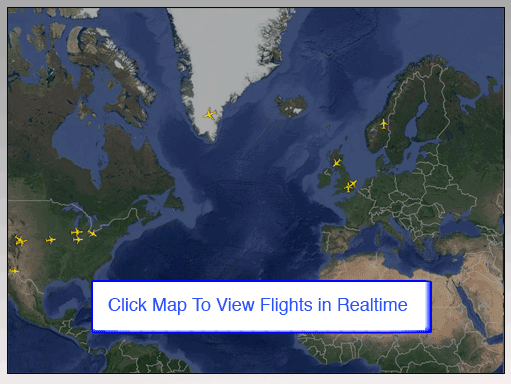 Here FlyingTypers continues our unique and singular, concerted
publishing effort in air cargo with Part Four of our ongoing exclusive
series “The Environment and the Aviation Industry” created
by noted industry leader thinker, dreamer and doer, the great Robert
Arendal. Here FlyingTypers continues our unique and singular, concerted
publishing effort in air cargo with Part Four of our ongoing exclusive
series “The Environment and the Aviation Industry” created
by noted industry leader thinker, dreamer and doer, the great Robert
Arendal.
FlyingTypers will continue
this series during 2019 and we invite your comments.
As you can see by our realtime biofuel
flights map here, United Airlines and SAS with a majority of the movements,
along with KLM, Lufthansa, Norwegian and some others have marshaled
scheduled biofuel flights. Measured against global airline operations
these flights are a modest first step in the right direction. The
skies remain wide open for even more of these movements as the clock
keeps ticking and our world keeps turning.
Geoffrey |
It’s an honour to write a few
words on the sustainable aviation industry on the Earth Day celebration.
The Earth Day initiative is the biggest environment movement in the world
and deserves respect for the effort to gain support and understanding
for how important it is for us as human beings to take action to combat
man-made climate change, extreme weather patterns, global pollution and
the steadily increasing global warming.
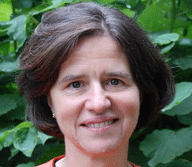 Mrs. Katherine Richardson, the highly renowned Professor from the Centre
for Macro Ecology, Evolution and Climate at Copenhagen University - also
among the 15 scientists and experts to draft the UN Global Sustainable
Development Report, appointed by Ban Ki-moon – today warned us that
unless we take some immediate, strong and forceful action, humanity shall
most likely not be able to keep global average temperature increase to
under 2 degrees Celsius – and thereby recklessly throw the planet’s
wellbeing into an unmanageable state of biodiversity changes that can
create severe consequences for future generations.
Mrs. Katherine Richardson, the highly renowned Professor from the Centre
for Macro Ecology, Evolution and Climate at Copenhagen University - also
among the 15 scientists and experts to draft the UN Global Sustainable
Development Report, appointed by Ban Ki-moon – today warned us that
unless we take some immediate, strong and forceful action, humanity shall
most likely not be able to keep global average temperature increase to
under 2 degrees Celsius – and thereby recklessly throw the planet’s
wellbeing into an unmanageable state of biodiversity changes that can
create severe consequences for future generations.
Mrs. Richardson especially pointed out that two
categories of man-made activities created around half of the global CO2/GHG
emissions – agriculture (29%) and transport (21%).
While aviation is “only”
2-3% of the transport emissions – it is like shipping – a
fast growing pollution that urgently needs to be tackled in order to reduce
its global CO2 footprint.
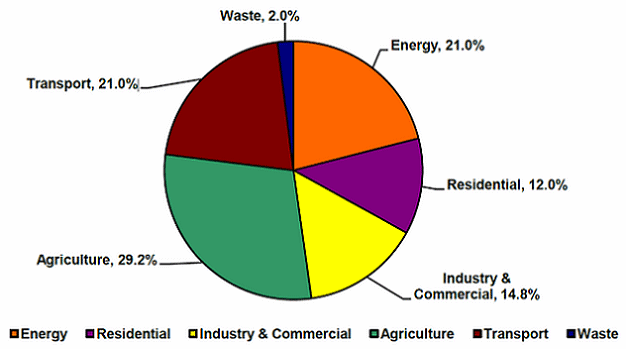 |
While ICAO, IATA, ATAG, the EU and
many other organizations are working hard at advancing the guidelines
and criteria for the transportation industry to transition from fossil
fuels to sustainable and renewable fuel resources, the time to achieve
this transition is becoming critically short, to avoid throwing the planet’s
biodiversity into irreversible imbalance.
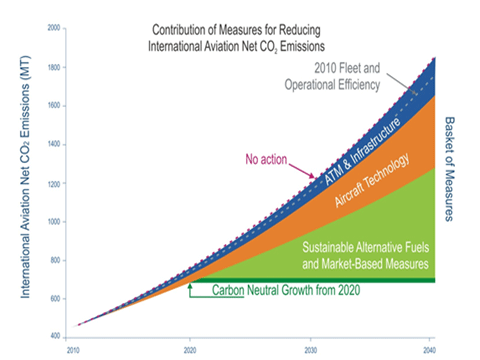 The new directives issued by the ‘EU and presently up for “hearing”
are excellent steps in the right direction. Of course immediate action
is required and while the EU might soon come to an agreement, will the
rest of the world align with the EU directives and/or come up with better
directives!
The new directives issued by the ‘EU and presently up for “hearing”
are excellent steps in the right direction. Of course immediate action
is required and while the EU might soon come to an agreement, will the
rest of the world align with the EU directives and/or come up with better
directives!
The UN ICAO 39th General Assembly
adopted the Carbon Offsetting and Reduction Scheme for International Aviation
(CORSIA) to address any annual increase in total CO2 emissions from international
civil aviation. 2019 and 2020 are basis for carbon neutral growth from
2020, against which emissions in future years will be compared. Starting
in 2021, when emissions covered by the scheme exceed the average baseline
emissions of 2019 and 2020, this difference will represent the sector’s
offsetting requirements for that year.
Pilot phase (from 2021 through 2023)
and first phase (from 2024 through 2026) would apply to States that have
volunterred to participate in the scheme.
As of May 31st 2017, 70 states –
representing 87.7% of international aviation activity, voluntarily participate
in the global Market Based Mecanism (MBM) scheme from its outset. Second
phase (from 2027 through 2035) would apply to all states that have an
individual share of international aviation activities in RTKs in year
2018 above 0.5 percent of total.
We have
the knowledge
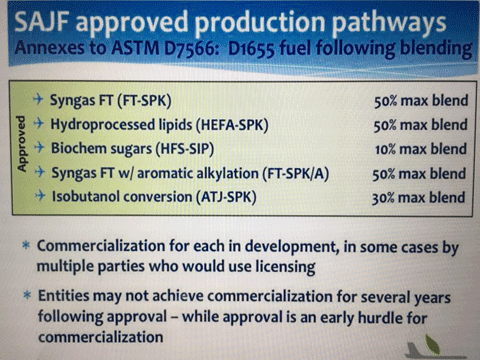 There are numerous technologies to produce Sustainable Aviation Fuels
(SAF), but so far only 5 technologies have been approved. And in most
cases, the cost of SAF is still above today’s price of Common Aviation
Fuels (CAF), but over time and with scaled up production, SAF prices shall
come down and eventually become competitive to CAFs.
There are numerous technologies to produce Sustainable Aviation Fuels
(SAF), but so far only 5 technologies have been approved. And in most
cases, the cost of SAF is still above today’s price of Common Aviation
Fuels (CAF), but over time and with scaled up production, SAF prices shall
come down and eventually become competitive to CAFs.
The Nordic countries are well placed
to participate in SAF production, but we can’t do it on our own.
We have strong competences and the
necessary technical know-how within different pathways and competences
and infrastructure are in place for refining technologies.
On the aviation side, airlines and
airports show a high willingness to use SAFs, but we need the politicians
and the producers to prioritize the development and the production of
SAFs.
Consequently,
the aviation sector calls on politicians to put SAF high up on the agenda.
The subject should be a high priority objective of every nation’s
energy policies and plans.
In spite of all good intentions and
high concern, we do not globally have a full functioning commercial supply
chain for SAFs. Yes, we do have small scale projects such as in Norway,
Sweden, Finland and on the U.S. West coast as well as in various other
locations in the world. But it is still on a very small scale compared
to where it has to be in order to attain our goal of a maximum of 2 degrees
average global warming within the coming decades.
On the positive side is the fact
that an increasing number of commercial flights operate worldwide on a
small blend of commissioned biofuels (SAFs). In the last decade, 80 multi-stakeholder
initiatives have been launched although some have been terminated, due
to various challenges, but many have survived and are encouraging potentials
for the future.
Since 2017/2018 SAFs have been available
at Oslo airport; fuel delivered and produced at a refinery in Porvoo,
Finland. In the U.S., Fulcrum Bioenergy, CEVO, Red Rock Biofuels and AltAir
have agreements with airlines for the supply of larger fuel amounts. These
are steps in the right direction.Feedsstock production
In the Nordic countries, the most
ideal candidates in the foreseeable future with respect to availability
and price, are wood residuals, wheatstraw and waste fractions.
Heavy competition from alternative
users can be expected from heat and power plants as well as biofuels for
road transportation; at least until such time as electric passenger cars
become a norm.
Other sources of feedstock are also
possible, but not curently available in any significant amount in the
Nordic (energy crops and marine resources, such as sweeweed and algae
may later become available, given economical production developments).
The UN Sustainable Development Goals - SDGs
The SDGs shall without doubt become
important future guidelines for global industries and societies. Consequently,
the Air Transport Action Group (a not for profit association that represents
all sectors of the air transport industry) did an interesting evaluation
of the SDGs “influence” on the global aviation industry and
provided the following view!
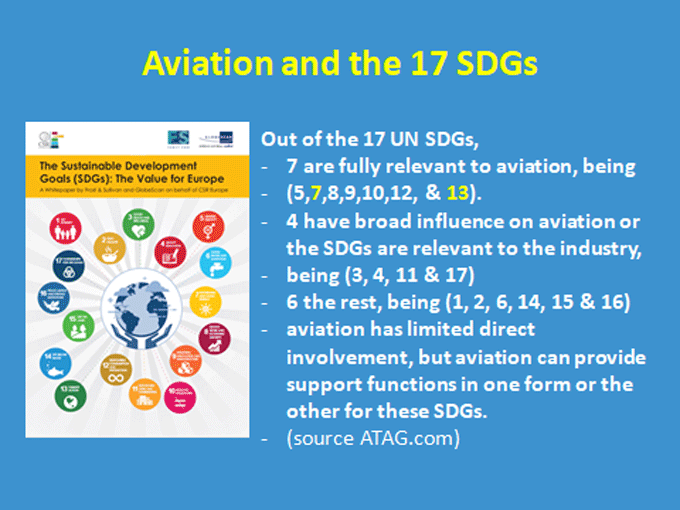 |
A Question
of Time!
 Considering the above mentioned steps towards a SAF global industry, it’s
a Question of Time before we see the major transition of aviation towards
an operation based on SAF. Yet again, time is of essence if we all want
to combat the escalating curve towards a world with average temperatures
above the target of the Paris Agreement and the SDGs of maximum 2 degrees
Celsius – above which we can expect irreversible biodiversity consequences
for future generations and for life in general on this planet!
Considering the above mentioned steps towards a SAF global industry, it’s
a Question of Time before we see the major transition of aviation towards
an operation based on SAF. Yet again, time is of essence if we all want
to combat the escalating curve towards a world with average temperatures
above the target of the Paris Agreement and the SDGs of maximum 2 degrees
Celsius – above which we can expect irreversible biodiversity consequences
for future generations and for life in general on this planet!
Comparing aviation’s efforts
towards sustainability to the EU expected road transport emission reduction
targets of minus 40% in 2030, minus 60% in 2040 and minus 80% in 2080,
aviation needs to speed up!
To conclude, both the aviation industry
itself and the industry’s customers – the passengers and cargo
clients – definitely want a transport system that operates on SAFs,
reduces its CO2/GHG emissions as well as its pollution - and in its overall
behaviour, act as a “good and responsible world citizen”.
Robert Arendal
 Air
cargo pioneer, dreamer, and doer Robert Arendal has over 45 years
of experience in the air cargo industry, occupying various shipping
and air cargo management positions in Europe as well as the U.S. In
1970 he became part of the management team that founded Cargolux Airlines
International SA, spending 29 years as Senior Vice President Sales,
Marketing and Cargo Services as well as Deputy CEO. Air
cargo pioneer, dreamer, and doer Robert Arendal has over 45 years
of experience in the air cargo industry, occupying various shipping
and air cargo management positions in Europe as well as the U.S. In
1970 he became part of the management team that founded Cargolux Airlines
International SA, spending 29 years as Senior Vice President Sales,
Marketing and Cargo Services as well as Deputy CEO.
Mr. Arendal is a founding father and
first Chairman of TIACA (The International Air Cargo Association).
He is a past President and presently a member of TIACA's President
Council and entered the legendary TIACA Hall of Fame in 1997.
He is co-founder of the Cool Chain Association
and has been its chairman for 10 years.
More recently, Mr. Arendal became a
founding member of the ‘Sustainable Biofuel Network,’
a group of stakeholders facilitating aviation’s transition from
fossil fuels to sustainable and renewable alternative biofuels. |
|





 Vol.
18 No. 26
Vol.
18 No. 26 Vol.
18 No. 27
Vol.
18 No. 27